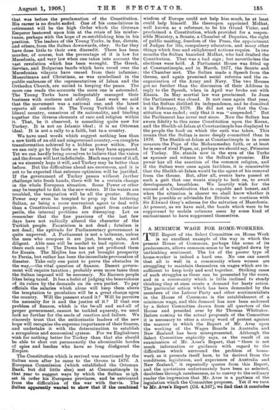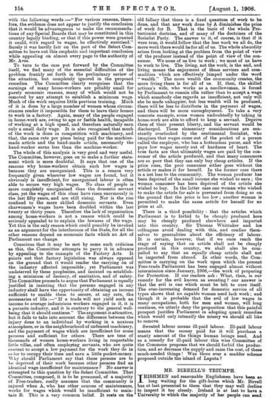A MINIMUM WAGE FOR HOME-WORKERS. T HE Report of the Select
Committee on Home Work is an excellent example of the way in which the present House of Commons, perhaps like some of its predecessors, allows common-sense to be weighed down by unthinking sentiment. The lot of the poorer type of home-worker is indeed a hard one. No one can assert that all is well in a community where women are struggling to maintain themselves on wages which are in- sufficient to keep body and soul together. Striking cases of such struggles as these can be presented by the score, and in a community which is little inclined to steady thinking they at once create a demand for hasty action. The particular action which has been demanded by the members of the Labour Party and other sentimentalists in the House of Commons is the establishment of a. minimum wage, and this demand has now been endorsed by a Select Committee drawn from all quarters of the House and presided over by Sir Thomas Whittaker. Before coming to the actual proposals of the Committee it is necessary to utter a strong word of protest against the manner in which the Report of Mr. Ayes upon the working of the Wages Boards in Australia and New Zealaud has been misrepresented. Although the Select Committee explicitly says, as the result of an examination of Mr. Aves's Report, that " there is not much information or guidance with regard to the difficulties which surround the problem of home- work as it presents itself here, to be derived from the conditions, legislation, and experience of Australia and New Zealand," it repeatedly quotes from this Report, and the quotations unfortunately have been so selected, doubtless through carelessness, as to convey to the ordinary reader the impression that Mr. Ayes is a partisan of the legislation which the Committee proposes. Yet if we turn to Mr. Aves's Report (Cd. 4,167), we find that it conoludes with the following words :—" For various reasons, there- fore, the evidence does not appear to justify the conclusion that it would be advantageous to make the recommenda- tions of any Special Boards that may be constituted in this country legally binding, or that if this power were granted it could, with regard to wages, be effectively exercised." Surely it was hardly fair on the part of the Select Com- mittee to leave out this emphatic and important conclusion while appealing on almost every page to the authority of Mr. Ayes.
To turn to the case put forward by the Committee itself, we find many of the essential difficulties of the problem frankly set forth in the preliminary review of the situation, but completely ignored in the proposed remedies. The Committee clearly recognises that the earnings of many home-workers are pitiably small for purely economic reasons, many of which would not be removed by any attempt to establish a minimum wage. Much of the work requires little previous training. Much of it is done by a large number of women whose circum- stances render it impossible for them to leave their homes to work in a factory. Again, many of the people engaged in home-work are, owing to age or feeble health, incapable of working at a high speed, and therefore naturally earn only a small daily wage. It is also recognised that much of the work is done in competition with machinery, and that, the same rate per piece being paid for the machine- made article and the hand-made article, necessarily the hand-worker earns less than the machine-worker.
The whole of this analysis is very good and very useful. The Committee, however, goes on to make a further state- ment which is more doubtful. It says that one of the reasons why home-workers obtain such low wages is because they are unorganised. This is a reason very frequently given wherever low wages are found, but it obviously is insufficient, for unorganised labour is often able to secure very high wages. No class of people is more completely unorganised than the domestic servant class, yet the wages of this class have risen enormously in the last fifty years, and are still rising. Nor is the rise confined to the more skilled domestic servants. Even charwomen's wages have been doubled within the last twenty or thirty years. Therefore the lack of organisation among home-workers is not a reason which could be seriously appealed to to explain the lowness of the wage. Yet this is the only reason which could possibly be invoked as an argument for the interference of the State, for all the other reasons depend on economic facts which no Act of Parliament can change.
Conscious that it may be met by some such criticism as this, the Committee attempts to parry it in advance by appealing to the example of the Factory Acts. It points out that factory legislation was always opposed on the ground that it would render the carrying on of the industry affected impossible ; yet Parliament was undeterred by these prophecies, and insisted on establish- ing a minimum of decency, of sanitation, and of safety. The Committee proceeds to argue that Parliament is equally justified in insisting that the persons engaged in any industry shall have the opportunity of obtaining an income sufficient to enable them to secure, at any rate, the necessaries of life :—" If a trade will not yield such an income to average industrious workers engaged in it, it is a parasite industry, and it is contrary to the general well- being that it should continue." The argument is attractive, but it fails to take into account the difference between the injury done to an individual by working in a noxious atmosphere, or in the neighbourhood of unfenced machinery, and the payment of wages which are insufficient for some persons and sufficient for others. There are tens of thousands of women home-workers living in respectable little villas, and often employing servants, who are quite content to accept a low payment for the work they do in oiler to occupy their time and earn a little pocket-money. "Why should Parliament say that these persons are to be deprived of their work because other persons find an identical wage insufficient for maintenance ? No answer is attempted to this question by the Select Committee. That Committee, composed, it is to be presumed, of a majority of Free-traders, coolly assumes that the community is injured when A, who has other sources of maintenance, works for wages which would be insufficient to main- tain B. This is a very common belief. It rests on the old fallacy that there is a fixed quantum of work to be done, and that any work done by A diminishes the price of work for B. That is the basis of the whole Pro- tectionist doctrine, and of many of the doctrines of the Socialist Party. The answer to it, of course, is that if it were true, it would follow that the less work we all do, the more work there would be for all of us. The whole absurdity arises from looking at the problem from the point of view of the producer instead of the point of view of the con- sumer. We none of us live to work ; we most of is have to work to live. The living, not the work, is the end, and living means the enjoyment of those services and com- modities which are effectively lumped under the word " wealth." The more wealth the community creates, the more living there is for all of us. If, then, the skilled artisan's wife, who works as a needlewoman, is forced by Parliament to remain idle rather than to accept a wage which somebody else regards as insufficient, not only will she be made unhappier, but less wealth will be produced, there will be less to distribute in the payment of wages, and there will be more unemployment. To take a very concrete example, some women undoubtedly by taking in home-work are able to afford to keep a servant. Deprive them of their present liberty, and the servant would be discharged. These elementary considerations are con- stantly overlooked by the sentimental Socialist, who imagines that wages come out of the pocket of a person called the employer, who has a bottomless purse, and who pays low wages merely out of hardness of heart. The true facts are that ultimately wages are paid by the con- sumer of the article produced, and that many consumers are so poor that they can only buy cheap articles. If the price rises, the poor consumer either goes without the article or makes it for herself. In the former case there is a net loss to the community. The woman producer has been deprived of the small income she wished to earn ; the woman consumer has been deprived of the article she wished to buy. In the latter case one woman who wished to make the article for sale is prevented from doing so on the ground that the price is too low ; another woman is permitted to make the same article for herself for no price at all.
There is a third possibility : that the articles which Parliament is to forbid to be cheaply produced here may be cheaply produced elsewhere and imported into this country. Sir Thomas Whittaker and his colleagues avoid dealing with this, and confine them- selves to generalities about the efficiency of labour. It is certain, however, that if we once reach the stage of saying that an article shall not be cheaply produced in this country, we shall also be com- pelled to say that an equally cheap article shall not be imported from abroad. In other words, the Com- mittee is carrying on the work upon which the present Free-trade Parliament has been engaged almost without intermission since January, 1906,—the work of preparing for Protection. If our readers ask : What, then, is our remedy for the evil known as sweating ? our answer is that the evil is one which must be left to cure itself. The ever-increasing demand for domestic service of all types shows that no capable woman need lack work ; and though it is probable that the evil of low wages in many occupations, both for men and women, will long continue, we utterly deny the proposition that this painful prospect justifies Parliament in adopting quack remedies which would only intensify the misery we should all like to remove.
Sweated labour means ill-paid labour. Ill-paid labour means that the money paid for it will purchase a scanty amount of the things human beings need. And as a remedy for ill-paid labour .this wise Committee of the Commons proposes that we should forbid the produc- tion, and so decrease the supply and raise the cost, of these much-needed things ! Was there ever a madder scheme proposed outside the island of Laputa ?



































 Previous page
Previous page